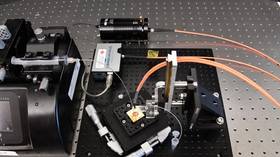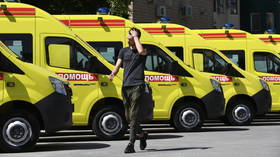Scientists develop cheap ‘lab on a chip’ which can detect Covid-19 antibodies in less than half-hour

Researchers in Japan have developed a low-cost Covid-19 antibody test that fits on a microchip and provides results in under 30 minutes without the need for medical training – a potential game changer in fighting the pandemic.
The team at the Okinawa Institute of Science and Technology Graduate University (OIST) just published their proof-of-concept study in the journal Biosensors and Bioelectronics.
Their device uses tens of thousands of tiny gold spikes, each smaller than the wavelength of light, to test diluted blood plasma for the presence of Covid-19 antibodies, which are illuminated by a fiber optic light probe.
Riccardo Funari, first author of the new research and a postdoctoral researcher in the Micro/Bio/Nanofluidics Unit at OIST, says that the current antibody testing arsenal faces two problems; tests are either accurate but slow, expensive and require expertise, or are easy to use, quick and portable but inaccurate.
Also on rt.com New nanosensor can detect cancer from a SINGLE DROP of bloodQuick and cheap but highly accurate antibody tests are therefore crucial to a fully-informed understanding of the virus and its spread throughout a given population, helping to guide coherent public health policy and allow for informed easing of restrictions on socializing and travel, for example.
The researchers claim that their new test detects the lowest-possible, but clinically-relevant antibody concentration, providing results within just 30 minutes.
Furthermore, they say the device is cheap to manufacture and precludes the need for technically-proficient lab workers thereby increasing the likelihood of more comprehensive, nationwide testing.
In addition, the device provides quantitative information about the total number of antibodies produced by a given immune system, expanding its application even further as it could provide useful information during research and development of current- and future-generation vaccines.
Also on rt.com Moscow to vaccinate 40,000 volunteers with 'Sputnik V' as Russian capital begins 3rd phase trial of pioneering coronavirus vaccine“The more antibodies that bind, the larger the shift in the wavelength of the absorbed light,” says Funari. “The fiber optic probe is connected to a light detector which measures this shift. Using that information, we can determine the concentration of antibodies within the plasma sample.”
If the device holds up to more rigorous clinical testing, soon medical staff could monitor a patient or vaccine trial participant’s immune response with a high degree of accuracy, in close to real-time.
The device could also identify potential donors for vaccine research and experimental treatments.
The researchers are hoping to expand the test to detect multiple different types of antibodies before performing tests on real patient samples in nearby hospitals and medical facilities in Okinawa.
Think your friends would be interested? Share this story!














